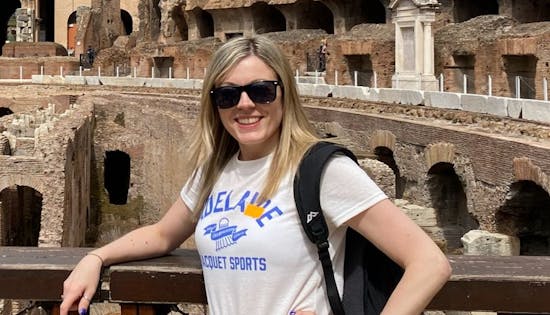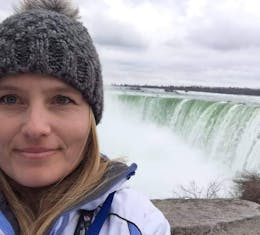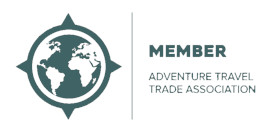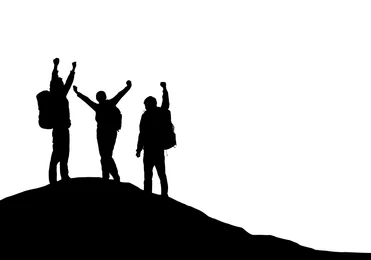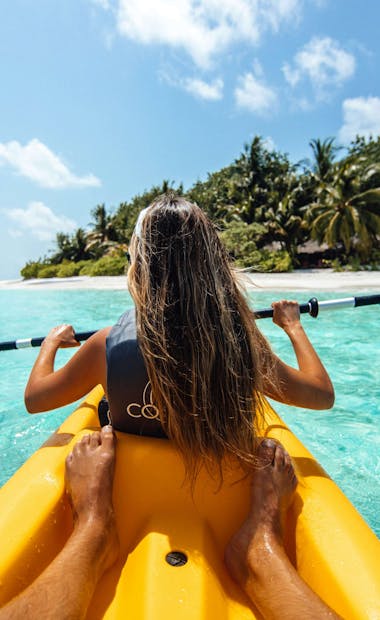Climb Mount Toubkal
Trek through the Atlas Mountains to see sunrise from North Africa’s highest peak
Popular tours
- Save18%
 View Tour
View TourToubkal Climb - 7 Days
- Marrakech to Marrakech
- Age group: 16 - 79
- Max group size: 16
Was:£580From£475 - Save16%
 View Tour
View TourClimb Mt Toubkal - 7 Days
- Marrakesh to Marrakesh
- Age group: 12 - 100
- Max group size: 12
Was:£449From£378 - Save1%
 View Tour
View TourMount Toubkal Trek - 7 Days
- Marrakesh to Marrakesh
- Age group: 15 - 99
- Max group size: 12
Was:£520From£515 - Save16%
 View Tour
View TourMount Toubkal Weekend Trek - 4 Days
- Marrakesh to Marrakesh
- Age group: 12 - 100
- Max group size: 12
Was:£349From£294 - Save21%
 View Tour
View TourMount Toubkal Winter Trek - 7 Days
- Marrakesh to Marrakesh
- Age group: 15 - 99
- Max group size: 12
Was:£765From£606  View Tour
View TourWinter Climb Mount Toubkal - 3 Days
- Marrakech to Marrakesh
- Age group: 12 - 80
- Max group size: 18
From£318
Climb Mount Toubkal
Trekking Mount Toubkal: Conquer North Africa's Highest Peak
Welcome to The Adventure People, specialising in trekking holidays. Are you ready to embark on an exhilarating journey to conquer Mount Toubkal, the highest peak in North Africa? Our guided treks to Mount Toubkal offer an unforgettable experience filled with stunning landscapes, cultural encounters, and a sense of achievement. Let us guide you through this SEO-optimized content to provide you with all the information you need for an epic Mount Toubkal trek.
Trekking Mount Toubkal: Mount Toubkal is nestled in the majestic Atlas Mountains of Morocco and stands tall at an impressive 4,167 meters (13,671 feet) above sea level. It presents an exciting challenge for outdoor enthusiasts and adventurers seeking to test their physical and mental limits. Our guided treks ensure a safe and rewarding experience, allowing you to focus on the journey while we take care of the logistics.
Highlights of the Mount Toubkal Trek:
Summiting North Africa's Highest Peak: Standing on the summit of Mount Toubkal offers breath-taking panoramic views that stretch across the Atlas Mountains and beyond. It's an awe-inspiring moment and a testament to your determination and resilience.
Diverse Landscapes: Trekking Mount Toubkal exposes you to a diverse range of landscapes, including rugged mountain trails, picturesque valleys, ancient Berber villages, and serene alpine meadows. Each step unveils a new and captivating vista.
Berber Culture and Hospitality: Encounter the rich Berber culture as you interact with local communities along the trek. Immerse yourself in their warm hospitality, savour traditional Moroccan cuisine, and gain insights into their way of life.
High Atlas Scenic Beauty: The High Atlas Mountains boast stunning natural beauty with snow-capped peaks, cascading waterfalls, and terraced fields. It's a photographer's paradise and a nature lover's dream.
Choosing the Right Trek: We offer a variety of Mount Toubkal trek options to suit different preferences and fitness levels. Whether you are an experienced trekker or a novice adventurer, our knowledgeable guides will tailor the trek to match your abilities and interests. From shorter itineraries to more challenging routes, we have the perfect option for you.
Preparing for the Trek: To make the most of your Mount Toubkal trek, it's important to prepare physically and mentally. Regular cardio exercises, endurance training, and hiking practice will help you build stamina and strengthen your muscles. Additionally, familiarize yourself with the gear and clothing essentials required for the trek, ensuring you have the right equipment to stay comfortable and safe throughout your journey.
Join Us for an Unforgettable Adventure: Embarking on a guided Mount Toubkal trek is an incredible opportunity to push your limits, connect with nature, and create lasting memories. Our experienced guides, local expertise, and attention to detail ensure a seamless and enriching trekking experience.
So, are you ready to conquer Mount Toubkal? Choose our travel agency for an unforgettable adventure to the summit of North Africa's highest peak. Contact us now to plan your Mount Toubkal trek and embark on a journey that will leave you with a sense of accomplishment and awe-inspiring memories that will last a lifetime.
When is the best time to trek Mount Toubkal?
The best time to trek Mount Toubkal is during the spring and autumn seasons, which offer the most favourable weather conditions for a successful and enjoyable trek. Here's a breakdown of the seasons and their characteristics:
Spring (March to May):
- Mild temperatures during the day, ranging from 10°C to 20°C (50°F to 68°F), making it comfortable for trekking.
- Blooming flowers and lush greenery, creating a picturesque landscape.
- Fewer crowds compared to the peak summer season, allowing for a quieter trekking experience.
- Possibility of some rainfall, so it's advisable to pack appropriate rain gear.
Autumn (September to November):
- Mild temperatures during the day, ranging from 10°C to 20°C (50°F to 68°F), similar to spring.
- Generally dry and stable weather, providing excellent visibility and clear views of the surrounding mountains.
- Vibrant autumn colours, particularly in late October and early November, adding to the scenic beauty of the trek.
- Popular season for trekking, but still less crowded compared to the summer months.
It's important to note that while spring and autumn are considered the best times to trek Mount Toubkal, weather conditions can be unpredictable in mountainous regions. It's advisable to check the weather forecast before your trek and be prepared for sudden changes in weather, including colder temperatures and occasional snowfall at higher elevations.
Summer (June to August) can also be a viable option for trekking Mount Toubkal, but it tends to be the busiest season. Daytime temperatures can reach 25°C (77°F) or higher, especially in lower elevations, making the trek more challenging due to the heat. However, if you can handle the warmer temperatures and are prepared for larger crowds, summer can still provide a rewarding trekking experience.
Winter (December to February) brings extremely cold temperatures and heavy snowfall to the region, making the trek significantly more challenging and suitable only for experienced trekkers with proper mountaineering skills and equipment.
Ultimately, the best time to trek Mount Toubkal depends on your personal preferences, level of comfort with varying weather conditions, and availability. Spring and autumn are generally recommended for a balance of favourable weather, manageable crowds, and scenic beauty.
How difficult is it to climb Mount Toubkal?
Climbing Mount Toubkal is considered moderately challenging, and the difficulty level can vary depending on various factors such as your fitness level, previous trekking experience, and the route you choose. Here are some key aspects to consider when evaluating the difficulty of climbing Mount Toubkal:
Altitude: Mount Toubkal is the highest peak in the Atlas Mountains, reaching an elevation of 4,167 meters (13,671 feet). The altitude can pose challenges, including reduced oxygen levels and the potential for altitude-related symptoms. Adequate acclimatization and proper pacing are crucial to minimize the risks associated with high altitude.
Steep Terrain: The trek to the summit of Mount Toubkal involves ascending steep and rugged terrain, particularly during the final stages of the climb. This requires good leg strength, endurance, and balance. Some sections may involve scrambling over rocks, so having basic rock scrambling skills can be beneficial.
Duration and Distance: The typical duration for a Mount Toubkal trek is around 2-3 days, depending on the route and the pace of the trek. Each day involves several hours of walking, including uphill and downhill sections. Being prepared for long days of trekking and having the stamina to sustain the effort is important.
Weather Conditions: Weather conditions in the Atlas Mountains can be unpredictable, with temperatures ranging from hot during the day to cold at night, especially at higher elevations. Be prepared for temperature variations and potential weather changes, including strong winds, rain, or even snow in the winter months.
Remote Environment: Mount Toubkal is located in a remote area, and facilities along the trekking routes are basic. The lack of amenities, combined with the rugged terrain and altitude, can make the climb more challenging compared to treks in more developed or accessible regions.
While climbing Mount Toubkal does require a reasonable level of physical fitness and mental determination, it is considered achievable for most individuals with proper preparation and a positive attitude. Engaging in regular exercise, including cardio and strength training, can help improve your fitness level and prepare your body for the challenges of the trek.
It's important to remember that climbing any mountain carries inherent risks, and it's advisable to join a guided trek or hire an experienced guide who can provide guidance, support, and ensure your safety throughout the journey.
Assess your own fitness level, consult with your trekking agency or tour operator, and be realistic about your abilities and limitations. With the right preparation, training, and mindset, climbing Mount Toubkal can be a rewarding and transformative adventure.
How fit do I need to be to climb Mount Toubkal?
Climbing Mount Toubkal requires a good level of physical fitness and stamina. While you don't need to be an elite athlete, it's important to prepare yourself adequately to handle the challenges of high-altitude trekking. Here are some key fitness considerations:
Cardiovascular Fitness: Trekking Mount Toubkal involves long hours of walking uphill, often at high altitudes. Focus on activities that improve your cardiovascular endurance, such as hiking, jogging, cycling, or swimming. Aim to build up your endurance gradually by increasing the duration and intensity of your workouts over time.
Leg Strength and Endurance: Strong leg muscles are essential for tackling the steep and sometimes rocky terrain. Incorporate exercises that target your leg muscles, such as squats, lunges, step-ups, and calf raises. Consider incorporating regular uphill or stair climbing workouts to simulate the conditions you'll encounter during the trek.
Core Strength: A strong core will help with balance, stability, and maintaining good posture while trekking. Include exercises that target your abdominal and back muscles, such as planks, sit-ups, and back extensions.
Flexibility: Flexibility is important for preventing injuries and enhancing your overall mobility on the trek. Incorporate stretching exercises or activities like yoga to improve your flexibility and range of motion.
Mental Preparation: Climbing Mount Toubkal is physically demanding, but it also requires mental resilience. Prepare yourself mentally by setting realistic goals, visualizing success, and developing a positive mindset. Mental preparedness will help you overcome challenges and keep going during difficult moments.
It's advisable to start your fitness training well in advance, ideally a few months before your trek. Gradually increase the intensity and duration of your workouts to allow your body to adapt and build strength over time. If possible, try to include some practice hikes or treks with a similar level of difficulty to Mount Toubkal in order to assess your fitness level and make any necessary adjustments to your training regimen.
Remember to consult with a healthcare professional before starting any new exercise program, especially if you have any pre-existing medical conditions or concerns. They can provide personalized guidance based on your individual health profile.
Being physically fit will not only enhance your enjoyment of the trek but also contribute to your safety and well-being throughout the journey. So, invest time and effort into preparing yourself physically and mentally, and you'll be better equipped to tackle the challenges and make the most of your Mount Toubkal climb.
Is altitude sickness a danger on Mount Toubkal treks?
Altitude sickness, also known as acute mountain sickness (AMS), is a potential risk when trekking Mount Toubkal or any other high-altitude mountain. As you ascend to higher elevations, the air becomes thinner and contains less oxygen, which can lead to various symptoms of altitude sickness. It's important to be aware of this risk and take necessary precautions to minimize its impact. Here's what you need to know:
Understanding Altitude Sickness: Altitude sickness can affect anyone, regardless of age, fitness level, or prior experience. It typically occurs when you ascend too quickly without allowing your body enough time to acclimatize to the higher altitudes. Symptoms can include headaches, dizziness, nausea, loss of appetite, fatigue, and difficulty sleeping.
Acclimatization: Adequate acclimatization is crucial for preventing altitude sickness. It involves ascending gradually, allowing your body time to adjust to the higher altitudes. Most guided Mount Toubkal treks incorporate acclimatization days and a gradual ascent to minimize the risk. It's important to follow the prescribed itinerary and not rush the process.
Hydration: Staying well-hydrated is essential at higher altitudes. Drink plenty of fluids, even if you don't feel thirsty, to keep your body hydrated and help prevent altitude-related symptoms.
Medications: Some trekkers may consider taking medication to prevent or manage altitude sickness. Consult with your doctor or travel medicine specialist to discuss whether medications such as acetazolamide (Diamox) are suitable for you. These medications can help with acclimatization, but they should not be considered a substitute for proper acclimatization practices.
Listen to Your Body: Pay attention to your body's signals and communicate openly with your trekking guide. If you experience symptoms of altitude sickness, it's essential to inform your guide immediately. They will assess your condition and make appropriate decisions, which may include rest, descending to lower altitudes, or seeking medical assistance if necessary.
Prevention Tips:
- Ascend slowly and follow the recommended itinerary to allow for proper acclimatization.
- Take rest days at higher altitudes to give your body time to adjust.
- Stay hydrated by drinking plenty of fluids, avoiding excessive alcohol consumption.
- Eat regular, nutritious meals to maintain energy levels.
- Avoid strenuous physical exertion at high altitudes.
- Dress appropriately for the conditions to stay warm and protect yourself from extreme weather.
Remember, altitude sickness can affect anyone, regardless of their fitness level or previous experience at high altitudes. Being aware of the symptoms, taking proper precautions, and following your guide's advice will help minimize the risks and increase your chances of a safe and enjoyable Mount Toubkal trekking experience.
What should I pack for my Mount Toubkal trek?
When packing for your Mount Toubkal trek, it's important to balance the essentials with keeping your backpack lightweight. Here's a comprehensive packing list to help you prepare for your adventure:
Clothing:
- Base layers: Moisture-wicking and quick-drying shirts and pants.
- Insulating layers: Fleece jacket or down jacket for warmth in colder temperatures.
- Waterproof and windproof outer shell: Jacket and pants to protect against rain, wind, and snow.
- Trekking pants or shorts: Lightweight and comfortable for hiking.
- Trekking shirts: Breathable and quick-drying.
- Warm hat and gloves: Essential for colder temperatures.
- Thermal socks: Moisture-wicking and warm.
- Hiking boots: Sturdy and comfortable footwear with good ankle support.
- Gaiters: To keep debris and snow out of your boots.
Equipment:
- Backpack: A comfortable backpack with a capacity of around 40-50 litres.
- Sleeping bag: Rated for cold temperatures (at least -10°C/14°F).
- Trekking poles: Provide stability and reduce strain on your joints.
- Headlamp: Essential for early morning or night-time hikes.
- Water bottle or hydration system: Stay hydrated throughout your trek.
- Sunglasses: Provide UV protection at higher altitudes.
- Sun hat and sunscreen: Protect yourself from the sun's rays.
- Basic first aid kit: Including altitude sickness medication, blister treatment, and pain relievers.
- Personal toiletries: Travel-sized items like toothbrush, toothpaste, and wet wipes.
- Snacks: Energy bars, trail mix, and high-calorie snacks for sustenance.
Miscellaneous:
- Trekking towel: Quick-drying and lightweight.
- Camera: Capture the breath-taking landscapes.
- Power bank: Keep your electronic devices charged.
- Travel adapter: If needed for charging your devices.
- Cash and travel documents: Carry necessary identification, permits, and some local currency.
Remember to pack your belongings in waterproof or dry bags to protect them from rain or snow. It's also advisable to pack light and carry only essential items to make your trek more comfortable.
Additionally, check with your trekking agency for any specific gear recommendations or requirements. They may provide additional equipment such as tents, sleeping mats, and cooking utensils.
Prioritize packing layers that can be easily added or removed to accommodate changing weather conditions. Be prepared for colder temperatures at higher altitudes, even during the warmer months.
Lastly, ensure that your backpack is properly fitted and comfortable to carry for long hours of trekking.
Consulting with your trekking agency or guide can provide more specific guidance based on the time of year and your personal needs.
For more information check out our Packing List for trekking.
Is my luggage transferred on my Mount Toubkal guided trek?
In general, for Mount Toubkal guided treks, your main luggage is usually transferred between accommodations by a support team or mules/porters. This allows you to trek with a lighter day pack containing only the essentials you'll need during the day. The specific arrangements may vary depending on the trekking agency or tour operator you choose, so it's essential to confirm the details with them beforehand.
Typically, you will be provided with a duffel bag or similar bag for your main luggage. You'll pack your belongings in this bag, and it will be transported separately to your next accommodation each day. It's important to note that there may be weight restrictions for your main luggage, so it's advisable to pack efficiently and avoid carrying unnecessary items.
While your main luggage is transferred, you will still need to carry a day pack with essentials such as water, snacks, extra layers of clothing, camera, sunscreen, and other personal items you may need throughout the day's trek.
Having your main luggage transported allows you to enjoy the trek without the burden of carrying heavy bags and ensures that your belongings are waiting for you at each accommodation.
However, please check in with the team here who can provide you with the most accurate and up-to-date information regarding the logistics of your trek.
How many people are in Mount Toubkal treks?
The group size for Mount Toubkal treks can vary depending on the trekking agency or tour operator you choose. Generally, group sizes for guided treks to Mount Toubkal range from small groups of 4-10 participants to larger groups of around 15-20 participants.
Smaller group sizes offer a more intimate and personalized experience, allowing for closer interaction with the guide and fellow trekkers. It can also provide more flexibility in terms of pacing, accommodations, and individual attention. On the other hand, larger groups may offer a more social atmosphere and the opportunity to meet and connect with a diverse group of fellow trekkers.
When selecting a trekking agency or tour operator, it's worth considering your preference for group size and the level of personal attention you desire during the trek. Some agencies also offer private or customized treks for those who prefer a more exclusive experience.
Keep in mind that the group size may also depend on the time of year you choose to trek Mount Toubkal. High season periods tend to attract more trekkers, while shoulder or low seasons may have smaller group sizes.
Regardless of the group size, trekking to Mount Toubkal is a memorable and rewarding experience, allowing you to immerse yourself in the stunning landscapes of the Atlas Mountains.
Is wifi available on Mount Toubkal trekking routes?
On the Mount Toubkal trekking routes, particularly in the remote and mountainous areas, access to Wi-Fi can be limited or even unavailable. The trek takes you through rugged terrains and high altitudes, where the primary focus is on enjoying the natural surroundings and the trekking experience.While some accommodations along the trek may offer limited Wi-Fi access in common areas, it's important to note that the signal strength and reliability may vary. In most cases, the Wi-Fi connection may be slow and intermittent due to the remote location and limited infrastructure.
It's advisable to not rely heavily on having constant internet access during your Mount Toubkal trek. Embrace the opportunity to disconnect from the digital world and fully immerse yourself in the natural beauty of the mountains.
If you need to stay connected or have any important communication requirements during your trek, it's recommended to check with your trekking agency or tour operator in advance. They can provide specific information on the availability of Wi-Fi or alternative communication options, such as satellite phones, if needed.
Remember, the Mount Toubkal trek offers a chance to disconnect from the digital realm and reconnect with nature, allowing you to fully appreciate the breath-taking landscapes and the adventure of the journey.
Is phone signal available on Mount Toubkal trekking routes?
In general, mobile phone signal coverage can be limited or sporadic on the Mount Toubkal trekking routes, especially in the more remote and higher altitude areas. As you ascend into the mountains, the signal strength may weaken or become unavailable altogether.
While there may be pockets of mobile phone coverage at certain points along the trek, it's important to be prepared for stretches where you may not have a reliable signal. Factors such as the specific mobile network provider and the location within the mountains can also influence signal availability.
It's worth noting that different mobile network providers may have varying coverage in the region. Some trekkers have reported occasional signal availability from certain network providers, while others have experienced little to no signal at all.
If maintaining phone communication is essential during your Mount Toubkal trek, it's advisable to check with your trekking agency or tour operator for more specific information regarding mobile phone signal coverage and recommended network providers. They can provide insights based on the current conditions and local knowledge.
However, it's important to embrace the trek as an opportunity to disconnect from constant connectivity and immerse yourself in the natural beauty of the surroundings. Enjoy the serenity and adventure that Mount Toubkal offers, and use the limited or absent phone signal as a chance to fully appreciate the journey.
What accommodation should I expect on Mount Toubkal treks?
During the climb of Mount Toubkal, various accommodation options are available to suit different preferences and budgets. Here are the common types of accommodation you can expect:
Mountain Refuges or Huts: These are basic shelters located at strategic points along the trekking routes. They provide simple dormitory-style accommodation with bunk beds or sleeping platforms. The facilities are usually shared, including communal dining areas and basic toilet facilities. Sleeping bags are often required, although some huts provide blankets. It's important to note that these huts can get crowded during peak trekking seasons.
Guesthouses or Lodges: In some villages along the trekking routes, you'll find guesthouses or lodges offering more comfortable accommodation compared to mountain huts. These accommodations often have private or shared rooms with basic amenities such as beds, blankets, and shared bathroom facilities. Some guesthouses may also offer common areas, dining facilities, and hot showers.
Camping: Camping is another option for those who prefer a closer connection with nature. You can bring your own camping equipment or rent it locally. Designated campsites are available along the trekking routes, and trekking agencies can assist in setting up camps and providing necessary equipment. Camping allows for a more immersive outdoor experience, but be prepared for basic facilities and limited amenities.
It's important to keep in mind that the availability and quality of accommodation can vary depending on the specific trekking route, the season, and the trekking agency or tour operator you choose. Some agencies may offer more luxurious or upgraded accommodation options, but these are typically limited and may come at an additional cost.
When planning your Mount Toubkal trek, consider your comfort preferences, budget, and the level of immersion you desire. It's advisable to book your accommodation in advance, especially during peak trekking seasons when availability can be limited.
Your chosen trekking agency or tour operator can provide detailed information on the specific accommodation arrangements for your trek and help you choose the option that best suits your needs.
Do I need trekking experience to climb Mount Toubkal?
While previous trekking experience is not mandatory, having some level of trekking or hiking experience can be beneficial when climbing Mount Toubkal. The trek to the summit of Mount Toubkal involves walking on uneven terrain, ascending steep slopes, and navigating through rocky paths. Being familiar with these aspects can help you feel more comfortable and confident during the trek.
However, Mount Toubkal is considered a moderate trek, and with adequate preparation, determination, and a reasonable level of fitness, it is achievable for most physically fit individuals. It's important to assess your own fitness level and consult with your trekking agency or tour operator to determine if the trek is suitable for you.
If you don't have prior trekking experience, it's recommended to engage in physical training and conditioning before your Mount Toubkal climb. This can include activities such as regular hiking, walking, cardio exercises, and strength training to improve your endurance, leg strength, and overall fitness.
Additionally, joining a guided trek or hiring an experienced guide is highly recommended, especially if you are new to trekking. A guide can provide valuable assistance, support, and local knowledge, ensuring a safer and more enjoyable trekking experience.
Remember to pace yourself, take regular breaks, and listen to your body during the trek. With the right preparation, determination, and a positive mindset, you can have a rewarding and memorable climb to the summit of Mount Toubkal.
What is the food like on Mount Toubkal treks?
During Mount Toubkal treks, the food provided is typically simple and nourishing, aiming to provide you with the necessary energy and nutrients for the climb. Here are some key points about the food on Mount Toubkal treks:
Local Cuisine: The food on Mount Toubkal treks often includes traditional Moroccan cuisine, which is flavorful and diverse. You can expect dishes such as tagines (slow-cooked stews with meat and vegetables), couscous, grilled meats, and Moroccan soups.
Carbohydrates and Protein: The meals are designed to provide a good balance of carbohydrates for energy and protein for muscle recovery. This is important for sustaining your energy levels during the trek. You can expect dishes with grains like couscous or rice, along with protein sources like chicken, beef, or vegetarian options such as lentils or chickpeas.
Fresh Ingredients: Many trekking agencies and guides prioritize using fresh ingredients whenever possible. Local produce and ingredients are often sourced, providing you with a taste of the local flavors and ensuring the meals are as fresh and nutritious as possible.
Nutritional Snacks: Along with the main meals, you may also be provided with snacks such as fruits, nuts, energy bars, and biscuits to keep you fueled and energized throughout the trek. It's important to have snacks readily available to maintain your energy levels during long hiking days.
Dietary Considerations: If you have specific dietary requirements or restrictions, it's essential to communicate this to your trekking agency or guide in advance. They will do their best to accommodate your needs and provide suitable alternatives.
It's important to note that the facilities and resources in the mountains are limited, so the variety of food options may be more limited compared to urban areas. However, the meals are typically hearty and satisfying, and many trekkers find the local cuisine to be a delightful part of their Mount Toubkal trekking experience.
Remember to stay hydrated during your trek by drinking plenty of water or other fluids. It's recommended to bring your own refillable water bottle and use water purification methods or bottled water to ensure safe drinking water throughout the trek.
Overall, the food on Mount Toubkal treks aims to provide you with nourishment, taste, and energy to fuel your journey while immersing you in the rich culinary traditions of Morocco.
Can I access drinking water on Mount Toubkal treks?
Yes, you can access drinking water during Mount Toubkal treks. However, it's important to note that the availability of drinking water may vary depending on the route and the specific accommodations or camping sites along the way. Here are some points to consider:
Natural Water Sources: Along the trekking routes, you may come across natural water sources such as streams, rivers, or springs. These sources generally provide fresh mountain water that can be suitable for drinking after proper treatment or filtration. Your guide or trekking agency can advise you on the safety and suitability of these water sources.
Purification Methods: It's recommended to bring your own water purification methods to ensure the safety of the drinking water. This can include water filters, water purification tablets, or a portable water purification system. These methods help remove or kill any harmful bacteria, viruses, or parasites present in the water.
Bottled Water: Another option is to carry bottled water during your trek. You can purchase bottled water in the towns or villages before starting your climb or at designated stops along the way. However, keep in mind that the availability of bottled water may be limited or more expensive in remote areas.
Refillable Water Bottles: Bringing a refillable water bottle is highly recommended to minimize plastic waste and ensure a constant supply of drinking water. You can refill your bottle from safe water sources or use treated water from your purification methods.
Hydration Bladders: Some trekkers find it convenient to use hydration bladders or reservoirs that fit into backpacks, allowing them to sip water through a tube without having to stop and take out a water bottle. This can be a practical option during the trek.
It's important to stay hydrated throughout your Mount Toubkal trek, especially at higher altitudes where the air is drier and dehydration can occur more easily. Aim to drink plenty of water and fluids to maintain your hydration levels. Your guide or trekking agency will also provide guidance on the availability of drinking water during the specific trek you choose.
Remember to treat water from natural sources or rely on properly sealed bottled water to minimize the risk of waterborne illnesses. Stay informed about the current conditions and consult with your trekking agency or guide for the most up-to-date information regarding drinking water sources along the route.
Can I drink tap water in Morocco?
In Morocco, it is generally not recommended to drink tap water unless it has been properly treated or filtered. The tap water may contain bacteria, parasites, or other contaminants that can cause stomach upset or waterborne illnesses, especially for individuals who are not accustomed to the local water supply.
To ensure safe drinking water in Morocco, it is advisable to take the following precautions:
Bottled Water: The most convenient and widely available option is to purchase bottled water from reputable brands. Look for sealed bottles and avoid purchasing bottles with broken seals or signs of tampering.
Water Purification: If you prefer to use tap water, it is essential to purify it before consumption. This can be done through various methods such as boiling, using water purification tablets, or using portable water filters. These methods help remove or kill harmful microorganisms.
Filtered Water: In some accommodations, restaurants, or establishments, filtered or purified water may be available. This water has been treated to make it safe for drinking. Confirm with the staff or inquire about the water source and filtration process before consuming it.
Refillable Water Bottles: Consider bringing a refillable water bottle with a built-in filter or a separate water filter attachment. These filters can help purify water from different sources, allowing you to fill up your bottle with tap water or from natural water sources after proper treatment.
It's important to note that the water quality may vary in different regions of Morocco, and it's advisable to exercise caution when it comes to consuming tap water. When in doubt, it's best to rely on bottled water or properly treated water to ensure your health and well-being.
Additionally, be cautious about consuming beverages with ice cubes or consuming raw or uncooked foods that may have been washed with tap water. It's always better to err on the side of caution and prioritize your health during your visit to Morocco.
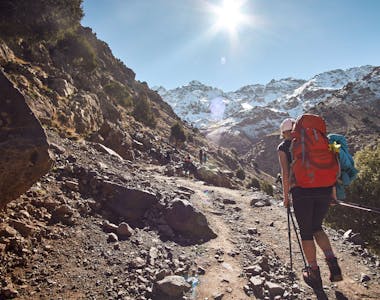
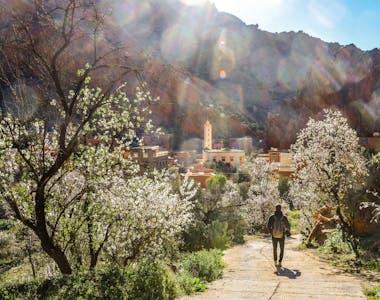
Book With Confidence
Monthly Payments
Spread the costs with no interest or additional fees
Best Price Guarantee
We won't be beaten on price. If you find this adventure at a lower price please get in touch!
Reserve now & pay later
Reserve your adventure today and pay later, free of charge
ATOL protected
Book with confidence
Hold your space today, for free
or book your trip with a deposit and then pay the rest in instalments.
Reserve your flights with us
Add flights to your booking and we'll take care of the rest. You'll get 24/7 support from our team & ATOL protection.
Speak to our experts
Call or email our expert team to find out more and help with ideas and planning.
